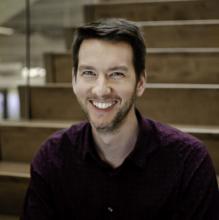Jean Michel Lauzon
What are your main responsibilities or activities in your current position?
In my current role as Partner Marketing Manager at SAP I work closely with a huge, multi-national, market-making partner to ensure our joint business is being presented to our audience effectively. It's lots of connecting-the-dots at the strategic level and then managing activity across both organizations to execute on marketing campaigns, live and virtual events, and other joint initiatives.
How does your current work relate to your graduate degree?
At the surface, my work in a software company is completely unrelated to my chemistry work but at a deeper level, there are a lot of similarities. My graduate studies taught me how to learn quickly and deeply about a specific subject and then communicate that knowledge, but also its importance, to a broad audience. The ability to seek out useful information, digest it so its understandable, and then demonstrate that value of your findings is the common thread between being a my current role and doing a PhD.
What do you like and what do you find challenging about your current position?
I do much less production of work as a Partner Marketing Manager than other roles I've had in my career. By this I mean I am more facilitating execution rather than building assets or running activities myself. This necessitates building relationships with other teams who are subject matter experts and explaining the value of the work we're doing with the partner. This is hard! Everyone has lots of work already. Creating and nurturing relationships is an important part of every job but it's never been as prevalent or critical for me as it is for my current role.
Is your current career path as you originally intended?
No at all. I knew partway into my PhD that I did not want to be an academic but didn't really have much direction after that. Neither of my supervisors had many contacts outside of the academic realm but they did find a postdoctoral fellowship for me working with the Canadian forest products industry. This exposed me to performing research within an economic framework, which was fascinating. During my postdoc I worked with another professor to spin-out a cancer imaging company and once that ran its course I worked at a start-up incubator helping companies expand into international markets. Now I work in marketing for a software company. I'm not sure I could have planned that path even if I'd wanted to!
What motivated you to pursue graduate work at UBC?
I went to Mount Allison, a small university in New Brunswick that doesn't have a graduate program so the undergraduate students do all the research. For a small university they had an active chemistry research program and I had the opportunity to perform research, publish papers, travel to particle accelerators in the UK and TRIUMF in Vancouver, and be a teaching assistant. One of my supervisors, Laurel Schafer, came to a conference we were hosting and gave a fantastic talk so I approached my professors for advice. They all said she was an amazing up-and-coming talent and I would be lucky to work for her. I asked if I could join her group and 4 months later I started my graduate studies at UBC.
What did you enjoy the most about your time as a graduate student at UBC?
The people I met, both in a professional and personal fashion, were incredible. That goes for the faculty and staff as well, not just the other students. The access to skiing didn't hurt either.
What key things did you do, or what attitudes or approaches did you have, that contributed to your success?
Flexibility is critical. You have to be open to opportunity when it arises even if it doesn't fit your pre-determined path. As long as you're on a steep learning curve and moving towards your ultimate goal, you're on the right track.
What is your best piece of advice for current graduate students preparing for their future careers?
Pursue what you like and be honest with yourself about what you don't like. I felt a little trapped since I didn't want to become a researcher but the whole system is set up to train you to become a researcher. I found talking to people that were research-adjacent helped me discover just how many options were available outside the university. I was surprised at how giving people with their time even though they had no idea who I was. Taking the time to get off campus to go talk to people was refreshing and they always were able to suggest someone else I should talk to.
How did you find out about/obtain your current position?
My first manager at SAP has continued to be an incredible champion for me. She heard through her connections that my current role was opening and approached me with the opportunity. When I expressed interest, she recommended me to the team and coached me through every step. I cannot stress how important it is to find a champion to help you navigate your career at levels you may not have reached yet. I thank mine every day.
How are jobs normally posted and filled in your organization or industry?
All our jobs are posted online and go through an internal process. However, like many organizations, it is possible to bring candidates to the top of the proverbial pile. The best thing to do is talk to everyone you can within the organization and communicate why you are interested in the role. What unique value would you bring? Even if you miss out on one opportunity, they'll know you're interested and may reach out when others become available.

